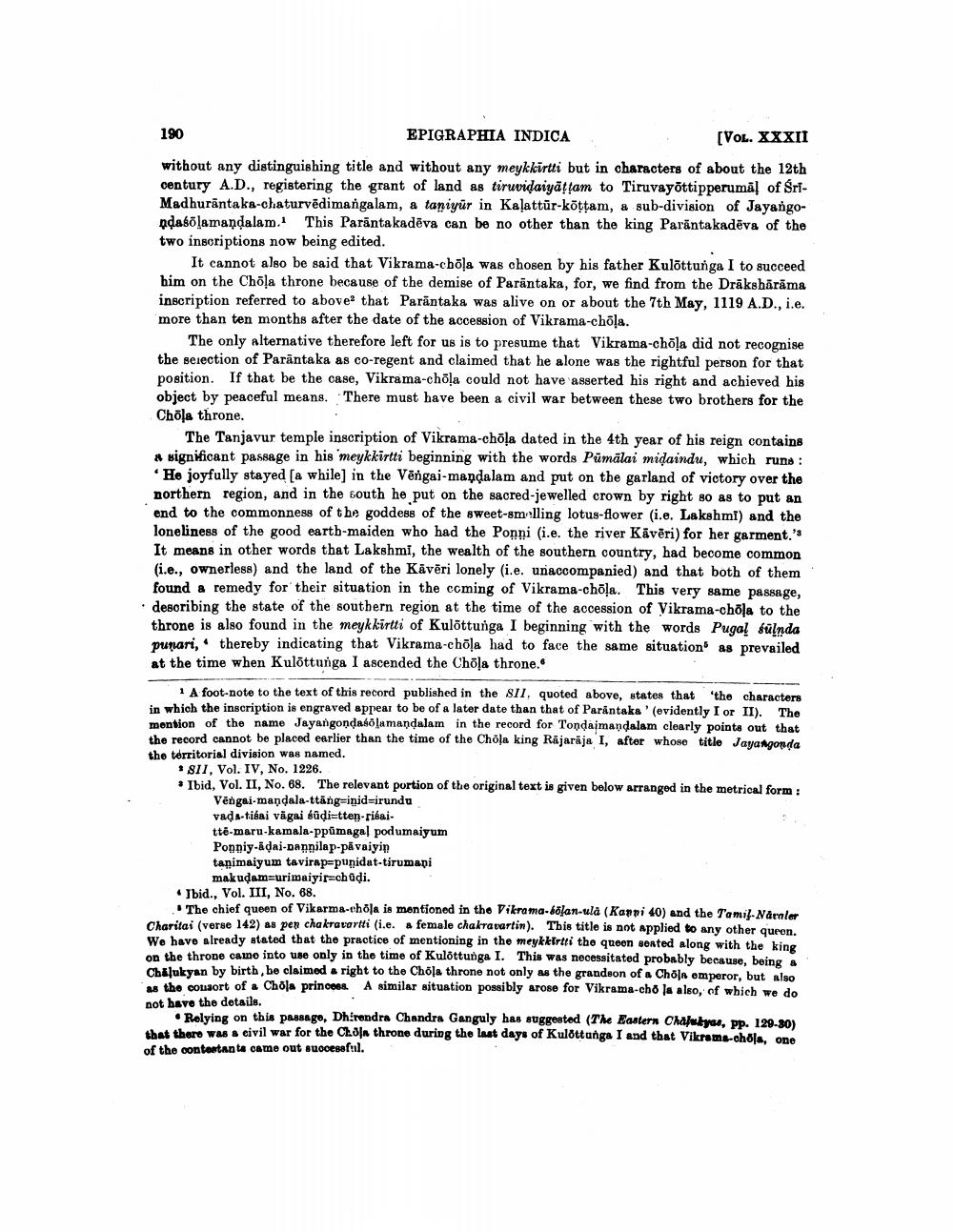________________
EPIGRAPHIA INDICA
[VOL. XXXII
without any distinguishing title and without any meykkirtti but in characters of about the 12th century A.D., registering the grant of land as tiruvidaiyaṭṭam to Tiruvayōttipperumal of ŚrīMadhurantaka-chaturvedimangalam, a taniyur in Kalattur-kōṭṭam, a sub-division of Jayangonḍaśōlamandalam. This Parantakadeva can be no other than the king Parantakadeva of the two inscriptions now being edited.
190
It cannot also be said that Vikrama-chola was chosen by his father Kulottunga I to succeed him on the Chōla throne because of the demise of Parantaka, for, we find from the Drakshārāma inscription referred to above that Parantaka was alive on or about the 7th May, 1119 A.D., i.e. more than ten months after the date of the accession of Vikrama-chōla.
The only alternative therefore left for us is to presume that Vikrama-chōla did not recognise the selection of Parantaka as co-regent and claimed that he alone was the rightful person for that position. If that be the case, Vikrama-chōla could not have asserted his right and achieved his object by peaceful means. There must have been a civil war between these two brothers for the Chōla throne.
The Tanjavur temple inscription of Vikrama-chōla dated in the 4th year of his reign contains a significant passage in his meykkirtti beginning with the words Pūmālai miḍaindu, which runs: He joyfully stayed [a while] in the Vengai-mandalam and put on the garland of victory over the northern region, and in the south he put on the sacred-jewelled crown by right so as to put an end to the commonness of the goddess of the sweet-smelling lotus-flower (i.e. Lakshmi) and the loneliness of the good earth-maiden who had the Ponni (i.e. the river Kävēri) for her garment.'s It means in other words that Lakshmi, the wealth of the southern country, had become common (i.e., ownerless) and the land of the Kāvēri lonely (i.e. unaccompanied) and that both of them found a remedy for their situation in the coming of Vikrama-chōla. This very same passage, describing the state of the southern region at the time of the accession of Vikrama-chōla to the throne is also found in the meykkirtti of Kulottunga I beginning with the words Pugal sulnda punari, thereby indicating that Vikrama-chōla had to face the same situation as prevailed at the time when Kulottunga I ascended the Chōla throne."
1 A foot-note to the text of this record published in the SII, quoted above, states that the characters in which the inscription is engraved appear to be of a later date than that of Parantaka' (evidently I or II). The mention of the name Jayangondasolamandalam in the record for Tondajmandalam clearly points out that the record cannot be placed earlier than the time of the Chōla king Rajaraja I, after whose title Jayangonda the territorial division was named.
811, Vol. IV, No. 1226.
* Ibid, Vol. II, No. 68. The relevant portion of the original text is given below arranged in the metrical form: Vengai-mandala-ttang=inid=irundu
vaḍa-tisai vägai sūḍi-tten-risai
tte-maru-kamala-ppümagal podumaiyum Ponniy-adai-nannilap-pävaiyin
tanimaiyum tavirap-punidat-tirumapi
makuḍam-urimaiyir-chüḍi.
Ibid., Vol. III, No. 68.
The chief queen of Vikarma-chōla is mentioned in the Vikrama-bölan-ulà (Kanni 40) and the Tamil-Navaler Charitai (verse 142) as pen chakravartti (i.e. a female chakravartin). This title is not applied to any other queen. We have already stated that the practice of mentioning in the meykkirtti the queen seated along with the king on the throne came into use only in the time of Kulottunga I. This was necessitated probably because, being a Chalukyan by birth, he claimed a right to the Chola throne not only as the grandson of a Chola emperor, but also as the consort of a Chola princess. A similar situation possibly arose for Vikrama-cho la also, of which we do not have the details.
Relying on this passage, Dhirendra Chandra Ganguly has suggested (The Eastern Chalukyas, pp. 129-30) that there was a civil war for the Chola throne during the last days of Kulottunga I and that Vikrama-chols, one of the contestants came out successful.




